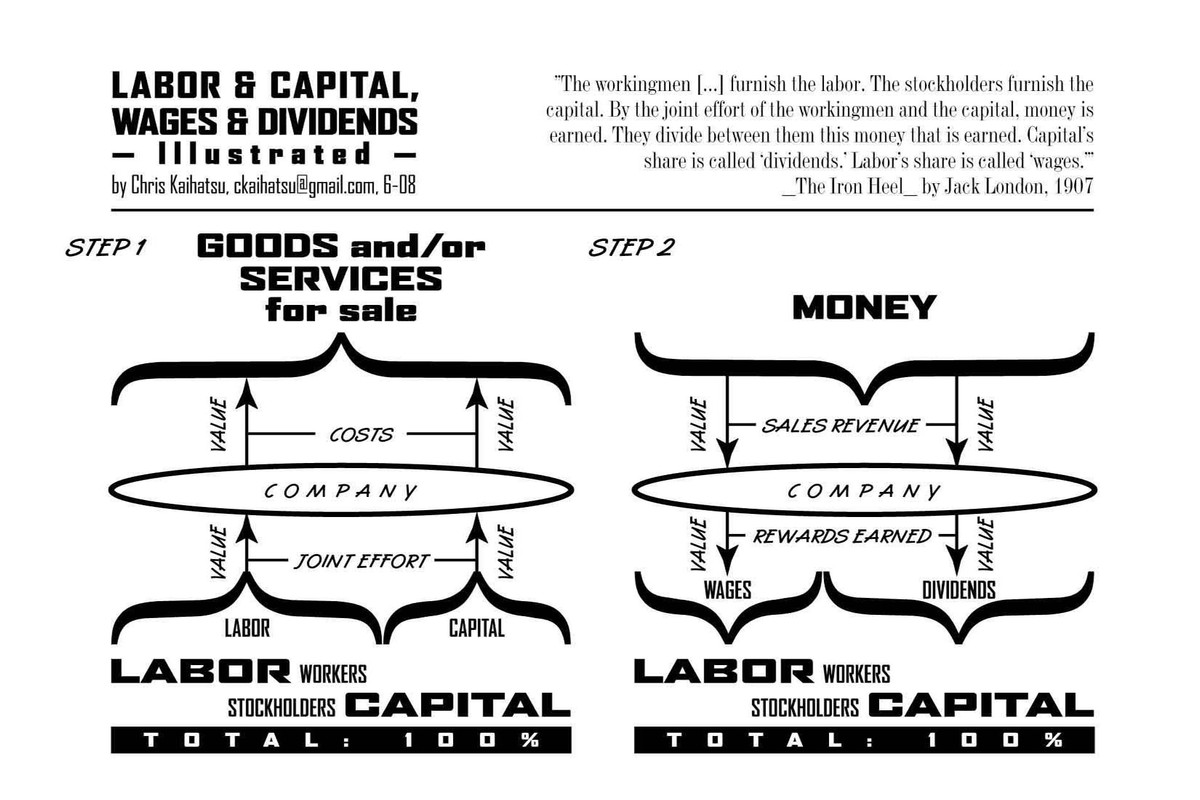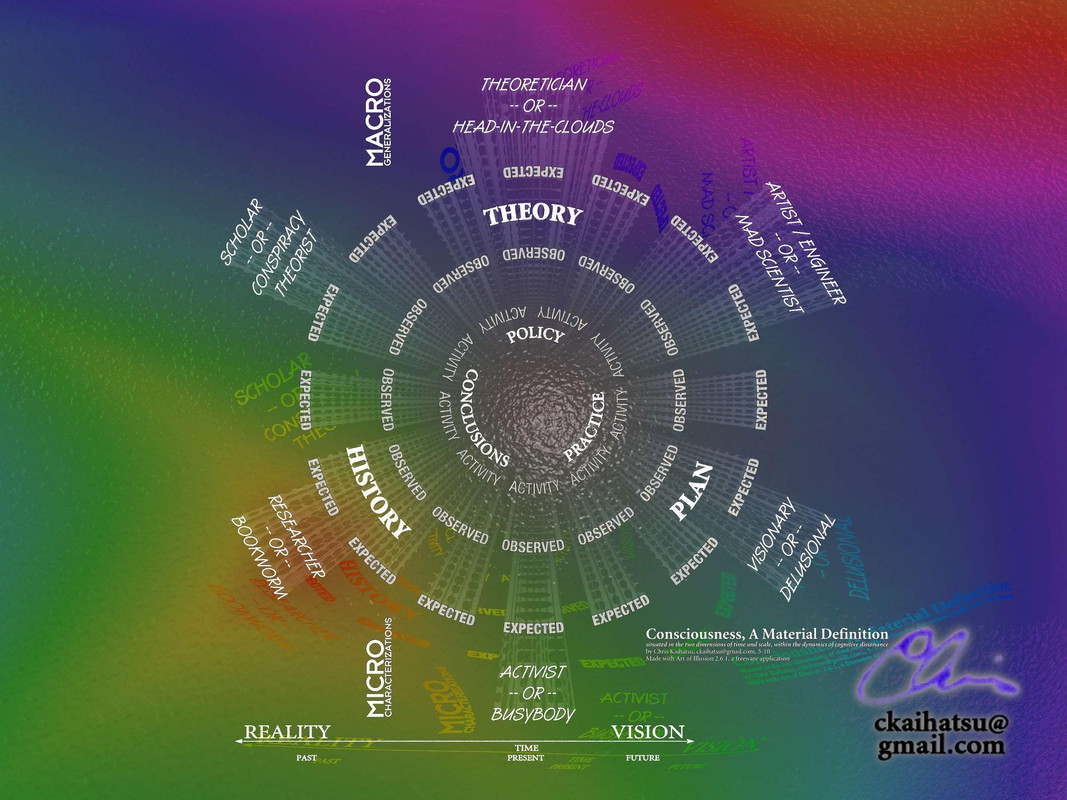Oxymoron wrote:
corruption happened as soon as more and more groups became franchised into the system. I think raising voting age, and only allowing people who have a Positive contribution to the country to vote. If you collect more from the government then you generate, you lose your right to vote.
This is politically *elitist* and economically *monetarist* -- you obviously value the *entity* of the nation-state, over the actual *people* of it, and to what end, exactly? More plutocracy and Western imperialist military conquest, most likely.
Unthinking Majority wrote:
I agree 500% with the OP.
Democracy is by the people for the people. Direct democracy or nothing. Skip the corrupt middle men.
And what of the *economics* -- ?
Are you for 'democratic economics', meaning an end to private property, at the very least?
If private property is to still exist, I've been mentioning and outlining a radical-reform that would be appropriate, that of not-rewarding private equity ownership with surplus labor value, for profit-making. I say turn 'ownership' into a civic duty and make it a norm to have *all* private funds handled *professionally*, by financial-industry types, at salaried positions. That way wage laborers can retain their full surplus labor value, in addition to their wages, and not be ripped-off every hour of the day.
[11] Labor & Capital, Wages & Dividends
---
Verv wrote:
I agree with the OP.
I am beginning to think that the best answer to politics is not necessarily having a government that is ever mobilized for political causes, but instead having guaranteed rights (as in a bill of rights), and then simply a series of bureaucrats who operate to fulfill the bill of rights, ensure an efficient economy, guard the borders, and participate in wars that are in our interest.
To cap it all off, it would be best if there was a balance between several estates. We've found that oligarchs are adept at manipulating the media and the people to get them to their bidding, and demagogues will also appear. There needs to be something immobile about the system -- something that is highly dependent on it for its existence, and owes their esteem and rank to it. It would make sense to have very autocratic, rigid elements in place to protect the sanctity of the rights, and to make any attempts at institutional capture difficult. Since they themselves would be limited by tradition & caste to the roles that they have, they would also be incapable of taking over the institutions that share the other half of the power.
I think something like this would be ideal for actually preserving human freedom -- democracy itself naturally decays into oligarchy, tyranny, or anarchy.
This is *romanticism*, though, politically, because you're imagining a purported 'stable' structure, when in fact the 'ancien regime', for example, was *riven* by court intrigues and power tensions between up-and-coming nobles (merchants, with equity capital), and the aristocrats (land owners, with *rentier* capital). The best thing about the French Revolution was that it did away *entirely* with the aristocracy, in one fell swoop, *decisively*.
Atlantis wrote:
It's not possible to quantify democracy, well, I guess there is some sort of index, but that's not necessarily meaningful to this debate.
The left-right political spectrum -- here's my own rendition:
Ideologies & Operations -- Fundamentals
---
Atlantis wrote:
Comparison with the US are absurd since EU members have national sovereignty and can leave the Union any time they want.
What about *this*:
https://en.wikipedia.org/wiki/Eurohttps://en.wikipedia.org/wiki/Maastricht_TreatyJeremiah Squatpump wrote:
Yes it’s sad, but democracy doesn’t work in modern societies containing tens or hundreds of millions. If you introduce a host of plurality cultures and mix in every minority agenda group under the sun, what you get is not cohesion but anarchy as the various groups fight it out amongst themselves. In a liberal democracy it’s no wonder the elite gain control.
Where is all this going? Progressivism. That’s the elite agenda behind it all. All this fantasy notion of a socialist utopia will disappear overnight when the anarchy reaches a certain point and the authorities crack down.
Why so dismissive over political *vision*, though -- shouldn't we 7+ billion people, in a digitally wired age, have *some* collective determination over where the world goes?
Consciousness, A Material Definition
Jeremiah Squatpump wrote:
From nearly a century ago, here are the 11 main points of cultural Marxism from the ‘Frankfurt School.’ See if you can see the similarities in today’s western societies.
1. The creation of racism offences.
2. Continual change to create confusion.
3. The teaching of sex and homosexuality to children.
4. The undermining of schools’ and teachers’ authority.
5. Huge immigration to destroy identity.
6. The promotion of excessive drinking.
7. Emptying of churches.
8. An unreliable legal system with bias against victims of crime.
9. Dependency on the state or state benefits.
10. Control and dumbing down of media.
11. Encouraging the breakdown of the family.
It was a long time coming, but liberal anarchy is the dumbing down period before authoritarianism.
I think all of your concerns here are strictly about the *civil society*, or the *cultural* domain, which *is* significant, of course, but these days sidesteps the more *pressing* issues-of-the-day, namely the crisis of capitalist economics and the bourgeois international nation-state system. The world is pretty-much *multicultural* now, culturally, but the class chasm yawns *wider* as time goes on -- 'income inequalty'.

















 - By Tainari88
- By Tainari88